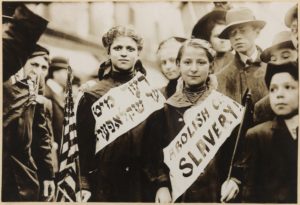“If a man kidnaps any of his brothers, fellow members of the community of Israel, and makes him his slave or sells him, that kidnapper must die; in this way you will put an end to such wickedness among you.”-Deuteronomy 24:7
Verses 6 and 7 of Deuteronomy 24 outline a very important principle that seems pretty much non-existent in our crazed make-tons-of-money-no-matter-what fire-breathing capitalistic society we live in today.
What exactly am I talking about?
I’m talking about the principle that it’s morally disgusting to take from a person the only means they have to survive (referring to the millstone in verse 6) just to make a profit or to merely satisfy a guarantee for a loan.
Following this same line of reasoning, verse 7 tells us we must not steal another human life for the purpose of enslaving them for personal use or selling them to another for profit.
It was understood that this type of horrific treatment was no different than treating the victims as animals or chattel.
The Torah makes clear the consequences for doing such a thing: EXECUTION OF THE KIDNAPPER.
The death of the kidnapper was the application of the principle of “eye-for-an-eye” or “life-for-a-life”.
However, in order to really understand the context of this commandment, we have to consider how society operated at the time.
In those days, at the conclusion of a battle, it was perfectly normal for the victors to take the members of the defeated population and turn them into slaves.
However, understand this was NOT considered kidnapping.
Instead, the captured people were viewed as spoils of war.
Not only that, but in Israel it was expected that over time, the women and children would eventually be assimilated into Hebrew society.
It wasn’t like they were viewed as subhuman property.
Recall in earlier portions of the Torah that mistreating slaves and servants whether they were gentiles or Hebrews was strictly banned.
In order to drive this point home, the Lord continually reminded the Israelites not to forget that they were once slaves in Egypt.
Again, a perfect example of the principle of humane treatment for slaves being fleshed out…
….was the incident at Shechem when Levi and Simeon killed all the adult males…
…and took the woman and children of the city to be their slaves.
Although these women and children were forcibly added to Israel’s population, they weren’t considered sub-humans to be mercilessly used for cheap labor.
Over time, they eventually were grafted into Hebrew society and became one with Israel…
…which is what will happen to the whole world when Messiah comes.
So the answer to the question of…
…does the Torah condone slavery…
…is a big whopping NO!




Leave a Reply